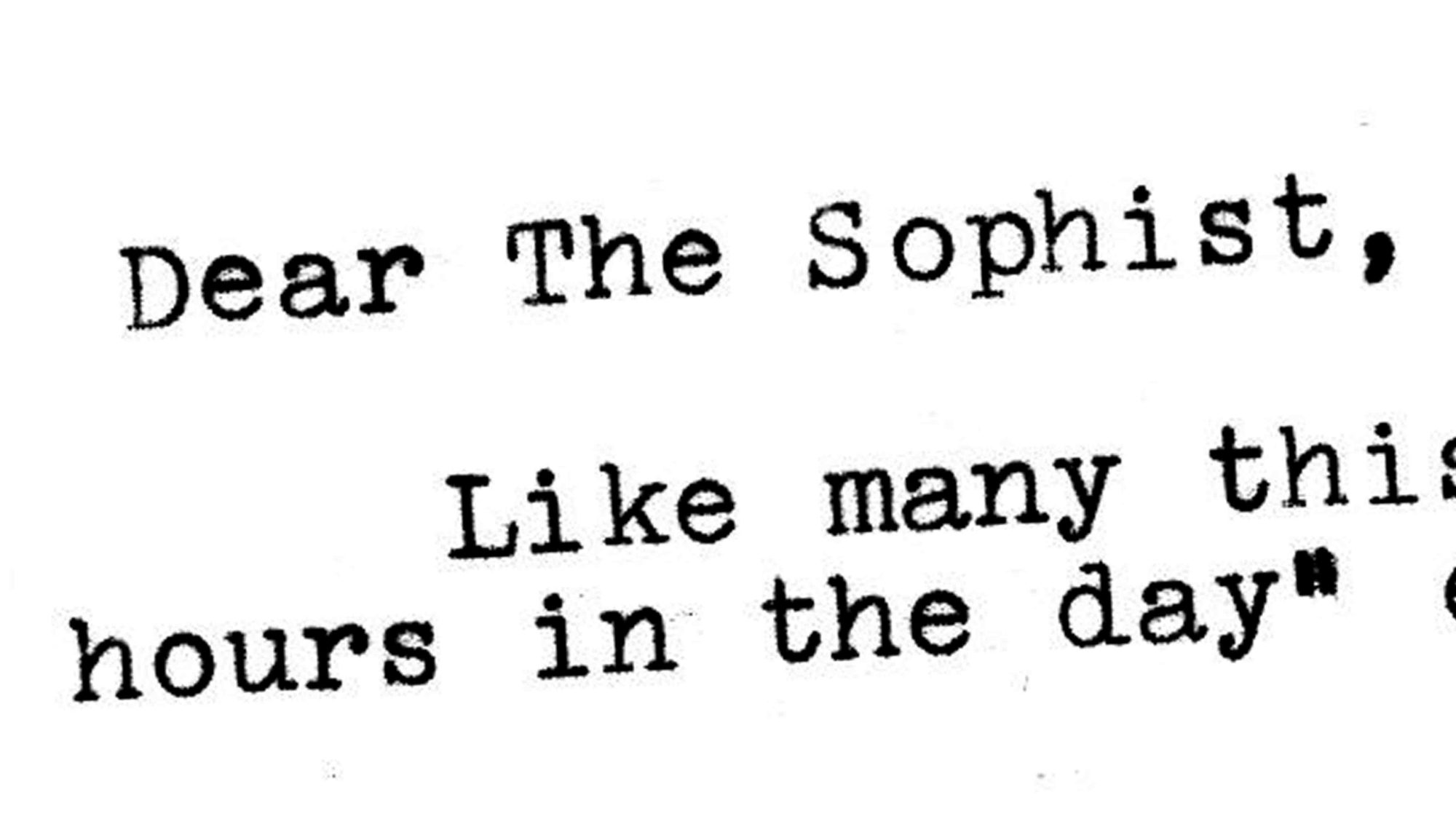
Dear The Sophist,
Like many this past year, I lost my “not enough hours in the day” excuse and finally wrote a novel. Though it began as only a personal exercise, once it was finished, I figured I should at least make a go of having it published.
To my surprised delight, after sending the opening chapters round a few places, someone at the levers of power got in touch to say that he would like to read more. How exciting! I was on my way to becoming A Novelist.
Then he did, in fact, read more. His final verdict, presented here in its entirety: “The sample was no doubt full of interesting ideas, but it was fairly tedious to read, for reasons we’ll spare you.” Huh?!
I know that The Sophist is here to tell me why I’m right (and I hope you’ll agree that I was right to reply with dignity and grace, suggesting that while I could handle the particulars if he wished to share them, I would also respect his decision to not take it any further) but what concerns me now is what I do with this information.
Are interesting ideas ever tedious to read, or is this a contradiction in terms? Isn’t the reading of literature a fairly tedious activity by its nature? Am I currently expressing interesting ideas in a manner that is tedious to read? And what, pray tell, am I being spared of? The judgment that I’m just a boring person? How do I add more pizazz to my writing, or, indeed, to my life?
With apologies for the necessarily humdrum nature of this existential quandary,
—Words Failed Me
P.S. If any literary agents or publishers desire a sleep aid of their very own, inquiries can be made at interestingbutfairlytedious@gmail.com
Dear Publisher Perished,
The Sophist is not going to deepen your exploration of boredom by giving you the threadbare old pep talk about all the now-acclaimed authors who had to overcome multiple rejections, or even their own deaths, before their works found their proper, appreciative audience. Nor is The Sophist going to demoralize you by dwelling on firsthand knowledge of the difficulty of getting the publishing industry to pay attention to even one charming little manuscript of fables, already supplied with brilliant illustrations.
No, you asked for help with your own particular rejection, and help is what you deserve. You know you did the right thing (or at least the professionally responsible thing), but that rightness is unsatisfying to you. As it ought to be, under the circumstances!
The rejection note is bad enough on its own (several fairly shocking degrees beyond bad enough!), yet receiving it on the heels of the initial positive interest, you experience it as not just cruel but puzzling: what went wrong between your sample chapters and your full manuscript, to turn your literary contact so cold? For reasons we’ll spare you, he said—when those reasons, you say to yourself, are the very thing you need! How can you make your work more salable and appealing without knowing why it was rejected? It must seem as if all your artistic hopes depend on the answer.
Nevertheless, you will not get the information you desire from this person. You politely filed your appeal for a fuller explanation, which is fine, and he will reject your appeal, which is how it is.
The Sophist does not think much of his means of telling you his opinion of your novel (your novel draft, let’s call it, to leave the door to its future open as wide as possible), but it is still possible to appreciate the logic of his position.
The Sophist has read many, many draft submissions of writing through the years, and has written many rejection letters. Figuring out what is wrong with a piece of writing is work. Coming up with a theory of how it might be fixed is even harder work. Your contact does not believe he can do this work to your draft, to his satisfaction, in a cost-effective manner.
If he were to describe to you what that work might look like, he would be trudging several steps down the road toward doing it. You would take his diagnosis—no matter how many layers of firm refusal he wrapped it in—as encouragement, and likely as an invitation to try again. The Sophist has tried to be the kind of editor who writes thoughtful, supportive notes of rejection, and the result has been that The Sophist has gradually turned into that genuinely monstrous kind of editor who may fail to give any response at all.
Here is a central truth about being an author, which your literary contact has, in his own harsh way, helpfully demonstrated: your book is immensely important to you, in a way that it is not, and cannot be, to anyone who works in the publishing industry. If your manuscript is your baby, you must imagine even the nicest, most helpful person you meet in publishing as a daycare operator dealing with 59 other kids across three classrooms. For you, the manuscript is the whole focus of your time and creativity; for him, it is one stack of papers in a whole stack of other stacks of papers that he has to deal with today, before more stacks arrive tomorrow.
This basic situation will still be the case even after you clear the hurdles to entry and are on your way to publication. Your editor owes you revisions on your first draft and a scheduled payment, but he is feuding with his boss and has stopped speaking with him. He finally quits, and your second draft gets passed around from editor to editor as an extra project someone has to pick up. Your publication date arrives at last, and your agent, who collects 15 percent of your money to advocate for you, is on vacation in Maine for the season. It is enough to make a person stick to posting clever, disposable things on the internet, even as they desperately daydream about writing something that might endure.
Courage! Here, if it helps, is a more uplifting way to interpret the terrible note: he wrote it to you as an equal. There’s no condescension or sugarcoating there, as if he were dealing with a deluded dreamer who needed to be let down easily. He addressed you in a blunt, grownup-to-grownup manner, counting on you to understand him—in his eyes, that is, you are already a professional; he just doesn’t want to do this piece of business with you.
What next? If you have a friend whose friendship with you is unshakably solid, and whose literary taste you trust, you may ask that person if they are willing to read your manuscript—but to read it only until the point at which they first get bored, and no further. Their explicit mission will be to stop reading at exactly that spot, and to tell you where it is, so that you can try to figure out what happens (or fails to happen) there.
Or maybe one of the readers of this column, to whom you have contrived to announce the existence of your manuscript and to supply your contact information, will volunteer to take a look and help out. The Sophist appreciates the spirit of your effort. The Sophist absolutely will not, however, take a look at your manuscript for you.
Stay warm in the slush pile,
The Sophist
THE SOPHIST is here to tell you why you’re right. Send your questions to AskTheSophist@hmmweekly.com, and get the answers you want.
